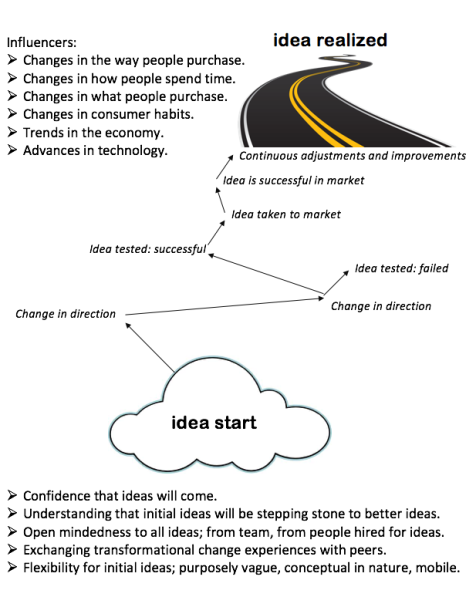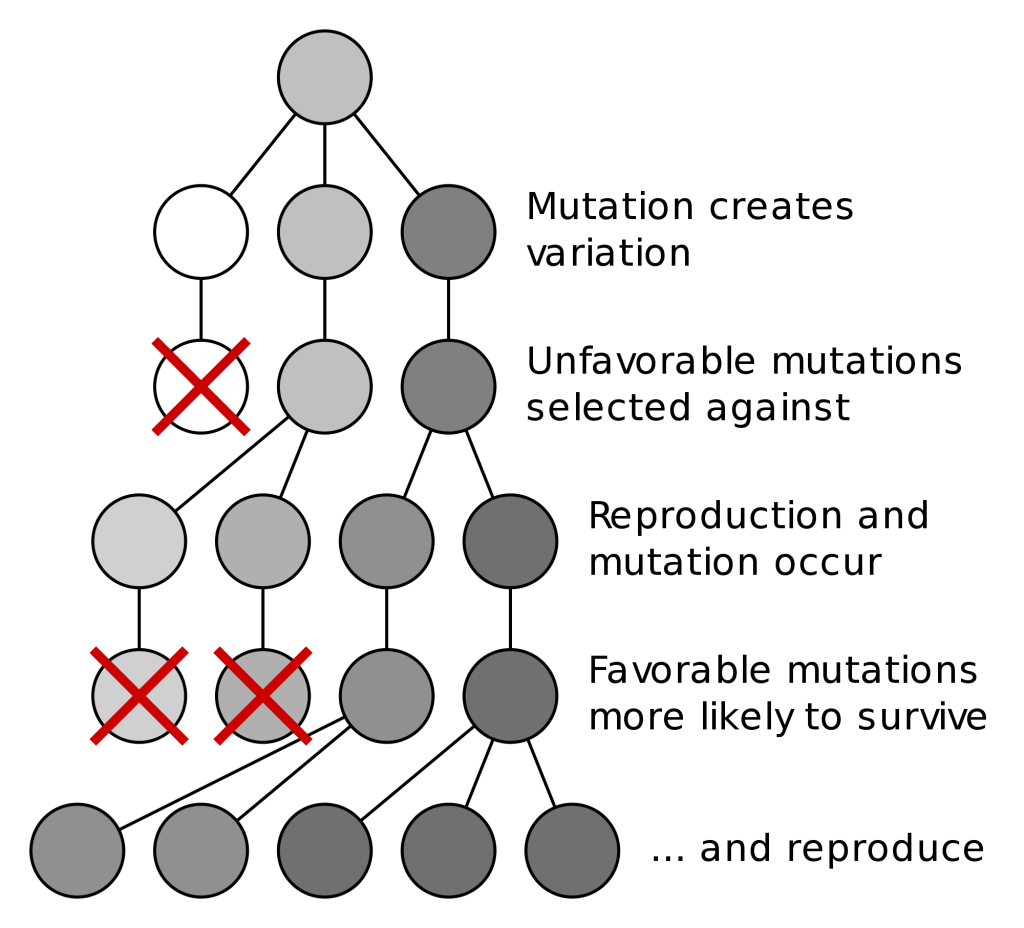Culture of Experts

Module #7
Ideas
Make better decisions … Streamline process … Balance company process and individual process … Troubleshoot process Cultivate ideas … Deepen projects … Find top employees … Encourage mentor/protege relationships
Improve communication … Springboard from failure … Expand job requirements … Add skills to your business growth plan
Enhance corporate culture … Increase retention … Develop employees … Find achievement … Expand organization
Ideas can expand business. A good idea ideas can make process more efficient, spark customer service, improve sales strategies and shape marketing programs. Ideas can create new products and services. Even though the term intellectual property is often associated with copyrights, trademarks and patents, they are simply ideas that belong to the company that created them. In this module, we will take a closer look at ideas.
Intellectual property
Every company has some type of intellectual property. Even if it exists outside of their product or service offerings, there will still be some type of intellectual property within a company’s sales, marketing or operational strategies. A lead-list of potential clients might be considered intellectual property. To an experienced salesperson, a healthy lead-list might be the best property a company can have.
When familiarizing oneself with a new company, trying to determine their key intellectual property can be an enlightening exercise. Is there a single invention that drives the entire company? Is there a methodology that gives them the edge? Do they use a specific technology that makes them superior? Does their marketing strategy position them above their competition? Does their backstory play out like a game of Monopoly, with acquisitions and franchises?
Trying to discover the intellectual property behind a restaurant can be particularly challenging. Certainly, their key intellectual property should be in the food. In addition, there will be a number of intangibles that have us going to restaurants when we could be eating at home for a fraction of the price. Sometimes, the experience itself is more of the secret sauce than the actual sauce.
Ideas, big and small
A big idea might lead to an entirely new product or service. When complex products are developed, research and development (R&D) is used as a formal process to develop ideas. If research and development is not formally executed, ideas still need some form of research and some type of development. A big idea can be as simple as placing an existing product into a new market segment. For this, it is the commitment that makes the idea big, by any definition. When seeding a product within a new market, there are sales, marketing, distribution and operational challenges to overcome.
Of course, the vast majority of ideas are small. A small idea might be as simple as a new way of describing a product feature so that a customer can more easily understand its benefit. Within a Culture of Experts, Unconventional Experts constantly create small ideas. To them, small ideas might be perceived as minutia adjustments to their individual work-process. Nonetheless, ideas are created, tested and developed. When there is failure, failure is used as a platform for new and better ideas. Ideas add to other ideas. Over time, these ideas will accumulate and show up within expert knowledge, skill, methodology and some level of mastery.
The expectations placed onto Unconventional Experts should not be focused on their ideas, although, there will be ideas. Nor, should the focus be on the ideas that they create within their individual work-process. Unconventional Experts are a long-term investment. Like all experts, they should be measured within the context of their expertise and their achievements over time.
Do you like Culture of Experts? Share with a colleague or group right now:
Hi, I’m sharing an interesting website with you, check it out: www.cultureofexperts.com
Default ideas
A technology company conducted a meeting to follow-up from a major trade show, for which they had a large exhibit. Within this meeting, employees were asked for feedback on the effectiveness of the company’s booth. Most people agreed that the booth did not effectively explain the functionality of a new computer network product, which was physically on display. For future consideration, one employee suggested a demonstration that was symbolic in nature. The example given was a scale model train that would be labeled with chunks of information on each car. The train was to demonstrate the way in which the information traveled and changed, consistent with the technology. The suggestion was met with laugher from a few engineers and the marketing manager quickly changed the conversation.
Within a Culture of Experts, ideas go through a process; either an individual work-process, a company-process or both. The idea that was used at the trade show was a default idea. It consisted of a physical display of the product and assumption that the people manning the booth would have a chance to verbally explain its functionality to potential customers. After the show, there was unanimous agreement that this was not effective. The scale train demonstration was a second idea that resulted from the failure of the default idea. This second idea was stopped dead in its tracks, never to be developed. This was unfortunate, as the product was new and would have benefited from improvements in the way in which its functionality was communicated.
Top-down or bottom-up
Big ideas usually start with leadership and work their way down. Small ideas usually start with workers, and hopefully, work their way up or work their way around. Sometimes, the value of an idea, and the extent of its development, is affected by where it originates. In reality, ideas don’t care where they come from. Ideas are ideas.
Share ideas
Methodology ideas
Ideas to solve problems
Ideas to hurdle obstacles
Ideas for potential projects
Process improvement ideas
Ideas from customer feedback
Ideas for improved communications
Ideas based on what other companies are doing
Ideas that are tested and shown to be a success or failure
Ideas that come from failure, as a platform for new and better ideas
Ideas can be dangerous
Newer companies are more apt to be idea-oriented, as there is more to gain than to lose. Within an LLC, new companies can go out of business without ruining the lives of those who start them. As companies evolve, they often grow into an operational focus, based on the ideas they had early on. With established companies, there is a reverence towards big ideas, with a thorough understanding of the time and money they can take.
Evolving Ideas into Evolutionary Change
Change always starts with an idea. Developing that idea into a great idea can be challenging. When brainstorming, many people strive for a holy grail idea; a single and concrete solution poised for certain success. With a hand full of historical exceptions, holy grail ideas are probably unrealistic.
The flow chart to the right shows the evolution of an idea. Notice that the idea does not take a specific route that leads to a predictable destination. For ideas to grow, they need to start in a cloud-like atmosphere where they have the flexibility to wander, change and evolve into reality.

Survival of the … fittest idea
In the animal kingdom, the survival of the fittest dominates. It has been said that human evolution has been stunted, as medical advancements influence human survival.
How did Albert Einstein, a man with autism and dyslexia, evolve humanity to new heights of knowledge? Within the human race, it is the idea that survives.

The Theory of »»»» Idea ««« Evolution
This neighboring chart shows Darwin’s Theory of Natural Selection. Mutations create variation. Unfavorable mutations die. Favorable mutations are more likely to survive and reproduce.
Just like the evolution of a species, a variation of ideas will have a greater chance of survival. As unfavorable ideas die and favorable ideas survive, there will be a greater chance of success.
Failure:
For those who create ideas, realize ideas and test ideas; there will be failure. There is a wide gap between those who only create ideas and those who carry them through. The realization and testing of ideas is rarely enough for substantial achievement. Great achievements often start with an idea and go though countless incarnations of trial and error.
When Thomas Edison was asked about the 1,000 failures that preceded the invention of the light bulb,
he replied, “I didn’t fail 1,000 times. The light bulb was an invention with 1,000 steps.”
Failure: Part of the process
Within the interview process, it is a common practice for interviewers to ask candidates about the failures that they had experienced within their careers. Candidates are asked to cite a specific failure. The conversations that follow will try to determine who the candidate blames for the failure and what actions they took to to overcome the obstacles they encountered. If the candidate is quick to blame outside forces for the failure, it raises concern over their ability to take responsibility for their work. If the candidate did not take appropriate action to overcome the obstacles, their problem solving skills come into question.
When interviewing Unconventional Experts, this questioning strategy might be flawed. Unconventional Experts look at failure differently. They are intimate with failure, as it is a part of their individual work-process. They may not even label their most ambitious failures as failures, but steps within the process. Talking about failure from a 20,000 foot view will not inspire answers that reflect their true potential.
Within a Culture of Experts, interview questions pertaining to failure should be asked at a much more granular level, within the context of the Unconventional Expert work-process. Interview questions for Unconventional Experts are summarized in module #12.
Obstacles do not block the path, they are the path.
Zen proverb
Go for the no
Within the sales world, there is an old saying: “Go for the no.” This means to drive the sale forward until the customer says no. Once the customer declines, the process is finished and the salesperson can move on to the next customer. This advice isn’t an attempt to get a no, it is to share understanding of the sales process. The sales process is simply a process and failure is a part of that process.
Unconventional Experts are problem solvers, but may not consider themselves as such.
To them, failure is simply a part of their individual work-process.
Unconventional Expert attributes associated with failure
[√] See obstacles like puzzles that need to be solved.
[√] Obsess over obstacle, until they are resolved.
[√] Do not label failures as failures, when they exist within their individual work-process.
[√] Most often bring failure onto themselves as they are not afraid to test their ideas.
[√] Gladly take full responsibility for the failures that happen within their individual work-process.
[√] Would rather overcome obstacles themselves, rather than pass on to others.
[√] Create projects to overcome obstacles when they exist on a larger scale.
[√] See value in the information gleaned from failure and use failure as a platform for new and better ideas.
“There are no knowns.
There are things we know that we know.
There are known unknowns.
That is to say there are things that we now know we don’t know.
But there are also unknown unknowns.
There are things we do not know we don’t know.”
Donald Rumsfeld
It is not the strongest of the species that survives, nor the most intelligent that survives. It is the one that is most adaptable to change.
Charles Darwin
Corporate Culture Assessment Questions
Module #7 – Ideas
13) As your company comes up with ideas, do you explore the process that evolves ideas in an attempt to create the best ideas possible?
14) When your company addresses failure, do you look at failure as it lives within the process and use it as a platform for new and better ideas?
See all of the module assessment questions in module #11
Culture of Experts Interview Questions
Module #7 – Ideas
15) Within your career, name one idea that you had, big or small, that stands out? Why does it stand out?
16) Within one of the categories below, name one idea that you had, big or small, that stands out? Why does it stand out?
• Hobbies
• Arts
• Crafts
• DIY home improvements
• Connoisseurship
• Inventions
• Disciplines
17) Give a specific example within your career when you tested an idea and it resulted in failure? How did you overcome failure?
See all of the module interview questions in module #12
Please proceed to module #8: Unconventional Training
Grow a Culture of Experts as you expand your company, use our recruiting services to fill your next open REQ. Go to ww.humancastle.com and call us at (716)222-3535.
© 2025 Human Castle LLC, unauthorized duplication is a violation of applicable laws.


